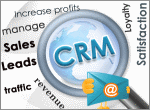
The world of CRM (Customer Relationship Management) has long been out of the reach of many SMEs (Small to Medium sized Enterprises), with expensive and extensive set up, running and customisation costs pricing them out of the market. On-site CRM systems became an industry standard and these systems could be incredibly expensive.
SMEs just didn’t have the budget to bring them into their businesses. Luckily for them though, the CRM sector has moved on, moving in a direction that makes CRM a reality, whatever the budget.
On-site CRMs required businesses to invest big in order to access the most cutting edge systems available. This could mean investments in improving the IT infrastructure of a business, or a good deal of customisation to make the system more effective for the needs and processes of the business. Whilst these aren’t downsides and in many cases dramatically improved the processes and efficiency of the businesses, they required and still require a lot of spending power up front.
The last year or so has seen renewed focus on hosted CRM, or more specifically cloud based CRM. Hosted CRMs use the SaaS model (Software as a Service), charge subscription fees, generally per user, for the use of their CRM solution. Almost all of the biggest CRM developers and providers have been pushing their cloud based solutions, especially as a cost effective solution for SMEs. They realised there was a great deal of untapped potential in the smaller businesses, and a great deal of demand for software systems that would allow them access to a toolset that could vastly improve the sales, buying and customer service processes of their business.
There’s no denying the benefits of CRM software, regardless of the turnover and customer base of the business. CRM software is there to simplify processes whilst boosting efficiency, streamlining access to important customer data and improving the communication process. Better tracking, better integration and unification of processes and data can transform a business, and whether it’s got 100 customers or a million, the CRM system is going to improve the way that a business interacts with those customers, the way it attracts new customers and the way it markets itself.
Hosted CRMs allow SMEs to get their hands on some of the most effective and flexible toolsets available at a monthly fee. Compared to the massive outlays required for on premises systems alongside the long lead time until that system is ready to go live, hosted CRM software allows for out of the box functionality, is less likely to require you to update your IT infrastructure or overhaul your servers (the hosting and databases are cloud based) and is ready to use as soon as you pay the subscription.
Whilst small initial outlays attract SMEs looking to compete with bigger companies on customer relationship management, there of course comes a point in which hosted CRM software does actually become more expensive. With long term monthly costs, eventually, they will start to exceed the cost of a fully integrated on premises solution. Whilst this is a downside in and of itself, hosted services have further benefits over on premises solutions that make these costs understandable.
Hosted solutions are updatable with no additional installation costs, meaning you don’t have to pay for further customisation or updates from an external provider; they are done automatically over the cloud and don’t affect your own systems.
Expanding the system and adding more users is as simple as upping the monthly subscription, whereas on premises solutions may require expansion of the IT infrastructure, and further integration of existing systems and customisation of the software.
Whilst hosted solutions provide SMEs with more options, they are in no way the miracle cure for CRM solutions. It always comes down to the individual requirements of each business, their current processes and the amount they’re willing to invest. We haven’t covered open source CRM in this article, merely because it’s not such a huge part of the market, although it can be an incredibly flexible (and perhaps more importantly cost effective) solution depending on what you need out of your CRM.
What hosted (and in some cases open source) does give SMEs is access to the tools that big businesses have been employing for years to improve the way their business functions. CRM Developers and providers are incredibly enthusiastic about pushing a solution that could dramatically change the playing field; isn’t it time the SMEs started getting enthusiastic about it too?
The author of this article works for a company that specialises in CRM for hedge funds and hedge fund sales software.
